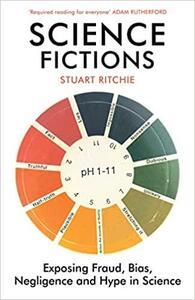Take a photo of a barcode or cover
123 reviews for:
Science Fictions: Exposing Fraud, Bias, Negligence and Hype in Science
Stuart Ritchie
123 reviews for:
Science Fictions: Exposing Fraud, Bias, Negligence and Hype in Science
Stuart Ritchie
A decent overview of the topic, but not as self aware as you'd expect
Extremely informative and well argued. I would suggest it to anyone who has any contact with science in their daily life (so... everyone). I loved the examples and statistics and that it's at the same time really approachable. For the layperson, it's pretty shocking to hear how null results and replication studies have been treated by even reputable journals.
There are a bunch of solutions offered at the end.
The only downside is that if an aspiring scientist were to read this book, they might throw in the towel before they even start. It sort of implies that it is basically impossible to do anything worthwhile in the sort of sets of study participants that junior level scientists have access to (alas, the dreaded P-value). Not being able to use your own ideas before you get that million-dollar grant after years of being small cog may discourage some. It's not the romantic ideal. But I guess it's for the best.
***
“Science, the discipline in which we should find the harshest scepticism, the most pin-sharp rationality and the hardest-headed empiricism, has become home to a dizzying array of incompetence, delusion, lies and self-deception.”
There are a bunch of solutions offered at the end.
The only downside is that if an aspiring scientist were to read this book, they might throw in the towel before they even start. It sort of implies that it is basically impossible to do anything worthwhile in the sort of sets of study participants that junior level scientists have access to (alas, the dreaded P-value). Not being able to use your own ideas before you get that million-dollar grant after years of being small cog may discourage some. It's not the romantic ideal. But I guess it's for the best.
***
“Science, the discipline in which we should find the harshest scepticism, the most pin-sharp rationality and the hardest-headed empiricism, has become home to a dizzying array of incompetence, delusion, lies and self-deception.”
informative
reflective
medium-paced
Informative and (seemingly) all-encompassing concerning this topic. Wouldn’t necessarily recommend this to people without any statistical/sciency background, since this wasn’t necessarily introducing but referring to statistical concepts.
Useful to have these concepts and their loopholes written down in one place to refer back to. Recommendable for any and all future scientists to increase awareness.
Bottom line is: whatever the parameter put in place to ensure reliability of research results, scientist will (intentionally) find ways to tamper with them in their favour.
Useful to have these concepts and their loopholes written down in one place to refer back to. Recommendable for any and all future scientists to increase awareness.
Bottom line is: whatever the parameter put in place to ensure reliability of research results, scientist will (intentionally) find ways to tamper with them in their favour.
For anyone who ever read an article quoting a scientific study or a self-help book based on research. Eye opening. Some of the most famous studies are not reproducible, and it’s a systemic issue. Love the opening from the author: seems like a combination of advocacy and technology could bring science back on track.
challenging
informative
medium-paced
Extremely good cautionary tale of how to take scientific publications with a pinch of salt
Interesting overview of the problems with bad science. Useful in learning what to look for when people cite a study that just doesn't quite seem like the data matches up with lived experiences. Interesting, in demonstrating how capitalist systems (though this is not specifically said) deteriorate cherished institutions.


